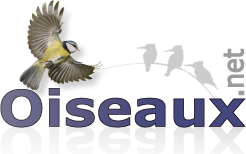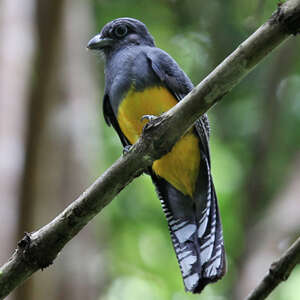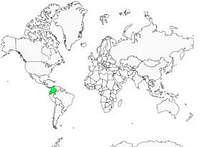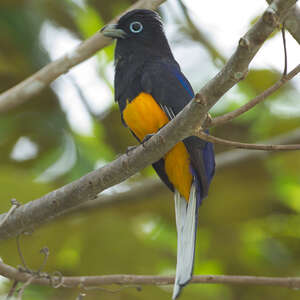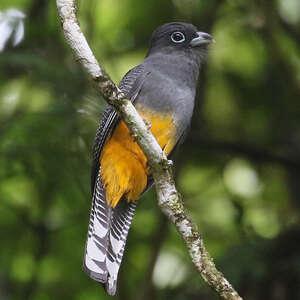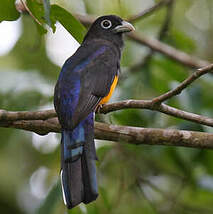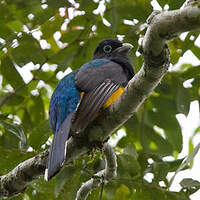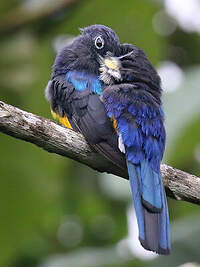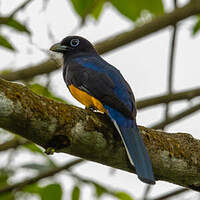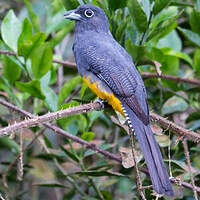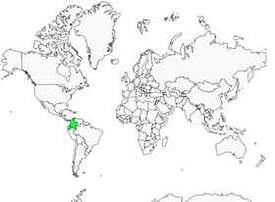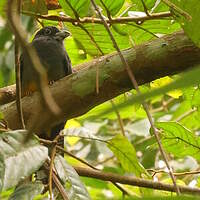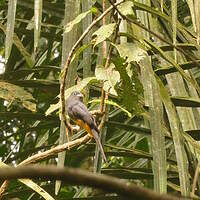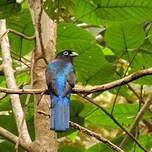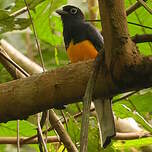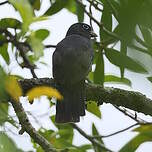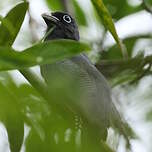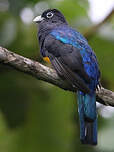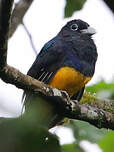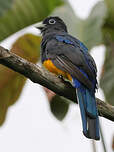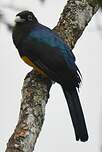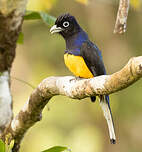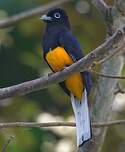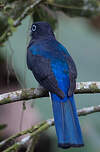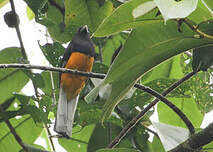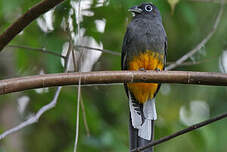White-tailed Trogon
Trogon chionurus - Trogon de Panama Trogon de Sclater
Identification
White-tailed Trogon (Trogon chionurus), friends Hellenists, to your Bailly! 'Chionos' can be translated as 'snow' or 'snowflake', likely referring to the entirely white under-tail coverts. In fact, we are dealing with Trogon viridis and its subspecies chionurus, which is sometimes treated as a separate species. The description of chionurus is actually the same as viridis, the noteworthy difference being the completely white tail of the male and the back coloration which clearly leans towards blue while viridis is greener; the female is identical to her cousin viridis with the base of the tail lightly striped while viridis is completely black.
Subspecific information monotypic species
Foreign names
- Trogon de Panama,
- Trogón coliblanco,
- surucuá-de-cauda-branca,
- Weißschwanztrogon,
- Witstaarttrogon,
- Trogone codabianca,
- vitstjärtad trogon,
- Hvithaletrogon,
- trogón nížinný,
- Lavlandstrogon,
- valkopyrstötrogoni,
- trogon cuablanc,
- trogon niebieskogrzbiety,
- Белохвостый трогон,
- オジロハグロキヌバネドリ,
- 白尾美洲咬鹃,
- vitstjärtad trogon,
- 西方白尾美洲咬鵑,
Voice song and call
He calls out with cow-cow-cow-cow in repeated stanzas up to 15 to 20 times, the voice of White-tailed Trogon appearing to be slower than that of viridis. The same can be said of its neighbor, the Violaceous Trogon, which also has the same range in Panama; White-tailed Trogon will sing less loudly and more slowly than Violaceous Trogon.
Habitat
Dietfeeding habits
Reproduction nesting
From March to June in Panama, January to June in Colombia and February to April in Venezuela. The nest is generally made in an old tree termite nest at an average height of 10 to 20 meters above the ground or an excavation made in a large tree. The exact incubation period is not known, but it can be similar to that of the White-tailed Trogon, which is a close cousin: two to three eggs incubated for 16 to 17 days, the young leaving the nest after 25 days.
Threats - protection
Sources of information
- IOC World Bird List (v14.2), Gill, F and D Donsker (Eds). 2024-04-18.
- A Natural history of the Trogonidae, Joseph M.Forshaw Albert Earl Gilbert
- Vol. 6 - Handbook of the Birds of the World, Josep del Hoyo-Andrew Elliott-Jordi Sargatal
- The Birds of Panama, George R.Anger Robert Dean
- xeno-canto, Sharing bird sounds from around the world,
- Avibase, Lepage Denis
- Wikipédia, Wikipedia, The Free Encyclopedia
Other sources of interest
 Specification sheet created on
02/08/2023 by Anne et Gabriel Leboff
Specification sheet created on
02/08/2023 by Anne et Gabriel LeboffTranslation by AI Oiseaux.net
© 1996-2025 Oiseaux.net
- Accipitriformes
- Aegotheliformes
- Anseriformes
- Apodiformes
- Apterygiformes
- Bucerotiformes
- Caprimulgiformes
- Cariamiformes
- Casuariiformes
- Charadriiformes
- Ciconiiformes
- Coliiformes
- Columbiformes
- Coraciiformes
- Cuculiformes
- Eurypygiformes
- Falconiformes
- Galliformes
- Gaviiformes
- Gruiformes
- Leptosomiformes
- Mesitornithiformes
- Musophagiformes
- Nyctibiiformes
- Opisthocomiformes
- Otidiformes
- Passeriformes
- Pelecaniformes
- Phaethontiformes
- Phoenicopteriformes
- Piciformes
- Podargiformes
- Podicipediformes
- Procellariiformes
- Psittaciformes
- Pterocliformes
- Rheiformes
- Sphenisciformes
- Steatornithiformes
- Strigiformes
- Struthioniformes
- Suliformes
- Tinamiformes
- Trogoniformes
